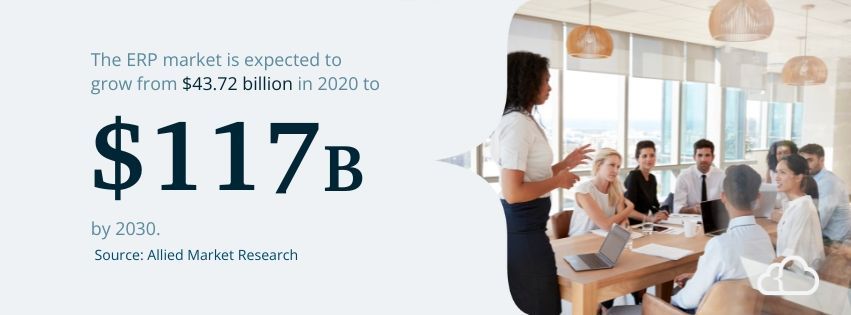Casey Watson is the Marketing Communication Specialist for SuiteDynamics. She has a degree in journalism from Murray State University and over 10 years of experience researching and writing about various subjects, including insurance, nonprofit work, and healthcare. She has been covering NetSuite ERP systems for more than two years.
29 Examples of Important NetSuite Terminology Every Newbie Should Know
A NetSuite ERP system can feel daunting to learn, but with a little help, you'll be zipping through it in no time.
An enterprise resource planning (ERP) system is a powerful software system, and more and more companies are realizing that fact. According to Allied Market Research, the ERP market is expected to grow from $43.72 billion in 2020 to $117.09 billion by 2030.
However, it’s also complicated. It has a thousand moving parts, and sometimes, it seems that each one has a confusing name or acronym. Learning to use an ERP can feel like learning a new language.
We know the terminology gets overwhelming, but if your business is going to stay competitive, you need cutting-edge technology and the knowledge necessary to use it. That’s why we’ve compiled a quick guide to NetSuite terminology (and general ERP terminology) for anyone unfamiliar with the system.
At SuiteDynamics, we know ERPs inside and out. We work with NetSuite to customize and implement NetSuite ERP systems. Our experts also offer thorough training that equips our clients to navigate the software easily.
Read our terminology guide. Then, schedule a free consultation with our team. We’ll ensure you have a NetSuite platform that solves your most significant problems and a staff that knows how to use it.

Common NetSuite Terminology
NetSuite terminology isn’t too hard to learn. These are the main words and phrases you need to know.
Advanced Revenue Management (Essentials) – A NetSuite module that automates recognition, forecasting, reclassification, auditing, and deferral. It uses a rule-based event handling framework, so you can configure rules that defer revenue for recognition across future periods.
Cloud ERP – An ERP system housed on the internet instead of in on-location servers. Employees can access it through common web browsers.
Customer Relationship Management (CRM) – A NetSuite module that manages customer relationships, supplier interactions, and more. It also automates marketing, sales force, and customer service and support.
Data Migration – The process of transferring information from one source to another. For example, a company might migrate its data from a legacy system to a NetSuite Cloud ERP.
Enterprise Resource Planning (ERP) – Software that unifies a company’s business programs and manages them from a single platform. An ERP system could encompass a general ledger, accounts payable, accounts receivable, inventory management, warehouse management, order management, manufacturing, and more.
ERP Deployment – The process of taking an ERP live. Companies can deploy their entire systems at once or deploy modules in stages.
ERP Module – An ERP software component that serves a specific department. Businesses can add modules as needed to expand their ERP functions. Common modules include finance and accounting, warehouse management, inventory management, manufacturing, e-commerce, supply chain management, and human resources.
Fixed Assets Management – A NetSuite module that oversees and controls an asset’s complete lifecycle—from creation to retirement. It also eliminates spreadsheets and manual work from the asset management process.
Implementation – The process of establishing and configuring a company’s ERP system. Its stages include planning and preparation, data configuration and migration, and testing and training.
Integration – The process of connecting an ERP with other programs and databases to work as a cohesive system.
Key Performance Indicator (KPI) – A measurement used to quantify a company’s successes, failures, and progress. For example, a company may track KPIs such as website visitors, conversion rate, and organic traffic to evaluate its digital marketing effectiveness.
On-Premises ERP System – An ERP housed in servers owned and maintained by the company using the ERP.
Out-of-the-Box Functionality – NetSuite terminology referring to the features built into every NetSuite ERP. An “out-of-the-box functionality” is not customized.
Planning & Budgeting – A NetSuite module that automates planning and budgeting processes. It helps accounting teams produce budgets and forecasts quickly, model different scenarios, and run reports. It also frees up time normally spent on manual data entry, allowing for more strategic analysis.
Scripting – A programming language used to manipulate systems and adjust their functions.
Service Resource Planning – A NetSuite module that supports service businesses. It’s designed to manage the complete bid-to-bill lifecycle. It also incorporates Customer Relationship Management, Professional Services Automation, and accounting/Enterprise Resource Planning.
Single-Point Solution – Software designed to perform one function for a business. For example, QuickBooks and MailChimp are single-point solutions.
Software-as-a-Service (SaaS) – A software delivery model in which a vendor delivers an internet application as a service. The vendor manages the application’s security, performance, and availability.
Software Vendor – A company that builds and sells software.
SuiteAnswers – An online collection of NetSuite educational resources, including support articles, best practices, training videos, and help topics.
SuiteBundles – A package of code that broadens NetSuite’s out-of-the-box functionality. For example, a company could use a SuiteBundle to automate advanced project management features in a dashboard view.
SuiteCloud Development Framework (SDF) – A development framework used to customize NetSuite. Developers can also use it to deliver customizations to various accounts.
SuiteCommerce – The first e-commerce system to integrate back-office tasks with customer experience. It allows users to manage sales, accounting, shipping, fulfillment, inventory control, and marketing from a single platform.
SuiteCommerce Advanced – A version of NetSuite’s e-commerce system that allows for maximum customization. Like SuiteCommerce, it enables users to manage sales and back-office functions like accounting, inventory management, and shipping. It just offers more control.
SuiteCommerce Extension – A coding framework that adds functions to an e-commerce site. For example, you can use extensions to incorporate gift certificate management, photo galleries, and product comparisons into your online store.
SuiteCommerce Theme – A plugin that decides how your web store will look. It includes general layout, fonts, colors, panels, and other aesthetic elements.
SuitePeople – NetSuite’s Human Resource Management system. It provides one source for staff information, facilitating more efficient employee management. It consists of two main modules: SuitePeople HR and SuitePeople U.S. Payroll.
SuiteScript – A programming language used in NetSuite customizations.
Third-Party System – NetSuite terminology referring to a system built by any company besides NetSuite.
Blow Away the Competition
Stop fighting a software system that's working against you. Instead, enjoy the benefits of an ERP that knits your operations together seamlessly and provides the data and analysis you need to trounce your competition.
We know you can rise in your industry.
Team up with SuiteDynamics to develop the ERP system your business needs. As a NetSuite Alliance Partner, we customize and implement NetSuite ERP software for clients in any industry.
The partnership doesn't stop there. We can work with you long after go-live, maintaining the system, training staff, and adjusting the software to accommodate your expansion.
Contact us today to start experiencing NetSuite success.
We pull information from NetSuite material, SuiteDynamics experts, and other reliable sources to compose our blog posts and educational pieces. We ensure they are as accurate as possible at the time of writing. However, software evolves quickly, and although we work to maintain these posts, some details may fall out of date. Contact SuiteDynamics experts for the latest information on NetSuite ERP systems.












